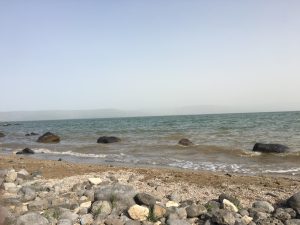By John G. Gardner, Coracle Fellow ’17
NOTES FROM A PILGRIMAGE
Several weeks ago, I had the privilege to be part of a pilgrimage jointly led by Telos and Coracle to Israel and Palestine. Rather than only visiting the holy sites connected with Jesus’ life, we also intentionally sought to understand the conflict in that land, meeting with Israelis and Palestinians involved in peacemaking as well as some who would prefer to have a solution on their own terms. We met an Israeli who called a Gazan woman “her neighbor,” with its echoes of the story of the Good Samaritan. We listened to a Palestinian farmer tell how his land is threatened even though he holds clear title and who nevertheless serves the Lord with joy. We met with a Greek Orthodox priest living alone in a monastery at Jacob’s Well, where Jesus met the Samaritan woman and revealed himself as Messiah to her. A hundred other vignettes of poignancy and hope marked the trip. Here are two thoughts from this pilgrimage:
In Jerusalem, the Church of the Holy Sepulchre stands at the site where Jesus is believed to have been crucified, buried, and raised. Our guide noted that it was outside the walls of Jerusalem at the time and that the place was also used for stonings of those who were condemned to death for violating the law. Stonings – such as that of the woman caught in adultery (John 8:1-11), who was presumably on her way to be stoned but was brought to Jesus first “to test him, that they might have some charge to bring against him.”
We know the story: Jesus “bent down and wrote with his finger on the ground” and then said “Let him who is without sin among you be the first to throw a stone at her.” The accusers all went away. No one condemned her; and Jesus responded, “Neither do I condemn you; go, and from now on, sin no more.”
Think of the location: Jesus knew that in a short time, he would go to the very place they were about to take her. She was being taken involuntarily; he would go voluntarily. She was being judged under the old law; Jesus freed her under the new law that he was writing on the ground and would later write in his own blood. She was going to be punished for sin; Jesus became sin for her and for all our sins when he “bent down” once more under the weight not only of a human-made Cross that he carried to Golgotha but the weight of our sins: God “made him to be sin who knew no sin, so that in him we might become the righteousness of God” (II Cor. 5:21).
On the northwest shore of the Sea of Galilee, Tabgha is the site of Jesus’ miraculous feeding of the five thousand (John 6:1-13). A beautiful church there has survived several attempts at destruction. Nearby is the “mensa Christi,” the table of Christ where Jesus met with his disciples after the Resurrection and served them breakfast after they hauled in a load of fish (John 21). Hearing the story there and the reference to “Peter bar Jonah” (“son of Jonah,” cf. Matt. 16:17) and looking at the water of the sea, this struck me:
For Peter, the three days of tortured waiting after having denied Jesus on Thursday night must have felt as hopeless and lonely as Jonah being in the whale. Jonah seems therefore not only a sign of Jesus’ death and Resurrection (Matt. 12:40) but a sign for us as well. Abandoning Jesus is like placing ourselves in the belly of the fish. It leads to the sense of remorse and despair that Jonah and Peter felt: “The waters closed in over me to take my life; the deep surrounded me; weeds were wrapped about my head at the roots of the mountains” (Jonah 2:5-6a); Peter “wept bitterly” (Luke 22:62).
 Yet there is hope! As Jonah prayed, “yet you brought up my life from the pit, O Lord my God. When my life was fainting away, I remembered the Lord, and my prayer came to you [.]” For Peter, after fishing all night and catching nothing the encounter with Jesus led to an abundant haul of fish and – far more important – Peter’s restoration. His threefold assurance that he loved Jesus in response to Jesus’ questions led to the welcome invitation once again from Jesus to “Follow me.”
Yet there is hope! As Jonah prayed, “yet you brought up my life from the pit, O Lord my God. When my life was fainting away, I remembered the Lord, and my prayer came to you [.]” For Peter, after fishing all night and catching nothing the encounter with Jesus led to an abundant haul of fish and – far more important – Peter’s restoration. His threefold assurance that he loved Jesus in response to Jesus’ questions led to the welcome invitation once again from Jesus to “Follow me.”
Follow Him. Dipping my feet in the warm, comfortable water there, I found that it dropped off quickly after the first step. If we want to go with Jesus, we have to be prepared to go in deeply, quickly in complete, utter trust and dependence on Him. Peter discovered that. I did, too, and am thankful.
“From now on, sin no more” and “Follow me” – wise watchwords as we continue our pilgrimage with Jesus. My very best wishes for a blessed and happy Easter season.
Alleluia, Christ is risen! The Lord is risen indeed, Alleluia!
Easter joy in Ghana: https://www.youtube.com/watch?v=s1qYQQEwPUU&feature=share
